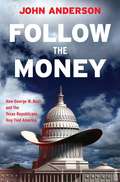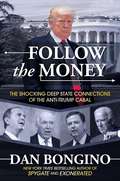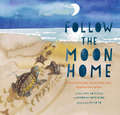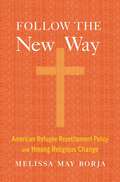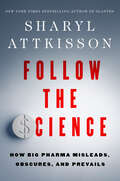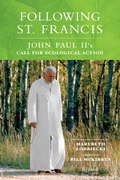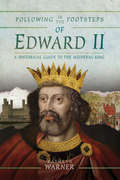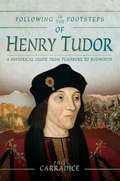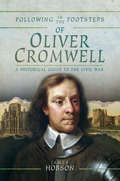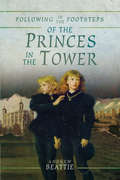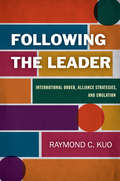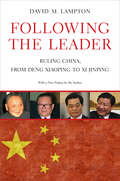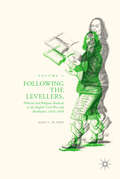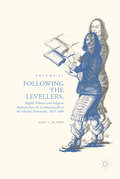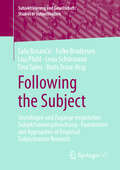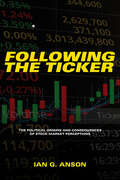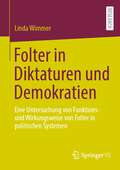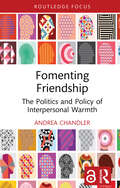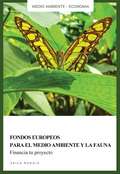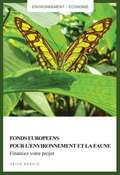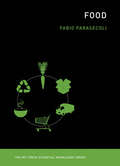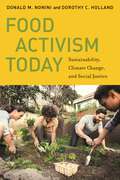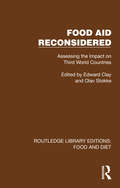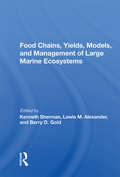- Table View
- List View
Follow the Money: How George W. Bush and the Texas Republicans Hog-Tied America
by John AndersonWith its barbecues, new Cadillacs, and $4,000 snakeskin cowboy boots, Texas is all about power and money -- and the power that money buys. This detailed and wide-scope account shows how a group of wealthy Texas Republicans quietly hijacked American politics for their own gain. Getting George W. Bush elected, we learn, was just the tip of the iceberg. . . . InFollow the Money,award-winning journalist and sixth-generation Texan John Anderson shows how power in Texas has long been vested in the interconnected worlds of Houston's global energy companies, banks, and law firms -- not least among them Baker Botts, the firm controlled by none other than James A. Baker III, the Bush family consigliere. Anderson explains how the Texas political system came to be controlled by a sophisticated, well-funded group of conservative Republicans who, after elevating George W. Bush to the American presidency, went about applying their hardball, high-dollar politicking to Washington, D. C. When George Bush reached the White House, he brought with him not only members of the Texas legal establishment (among them former White House counsel Harriet Miers and Attorney General Alberto Gonzales) but empowered swarms of Republican lobbyists who saw in Bush's arrival a way to make both common cause and big money. Another important Beltway Texan was Congressman Tom DeLay, the famous "Exterminator" of Houston's Twenty-second District, who became majority leader in 2003 and controlled which bills made it through Congress and which did not. DeLay, in turn, was linked to lobbyist Jack Abramoff, who used his relationships with both DeLay and Karl Rove on behalf of his clients, creating a shockingly corrupt flow of millions of dollars among Republican lobby groups and political action committees. Washington soon became infected by Texas-style politics. Influence-peddling, deal-making, and money-laundering followed -- much of it accomplished in the capital's toniest restaurants or on the fairways and beaches of luxurious resorts, away from the public eye. The damaging fallout has, one way or another, touched nearly all Americans, Democrat and Republican alike. Follow the Moneyreveals the hidden web of influence that links George W. Bush, Dick Cheney, and the Texas Republicans to the 2000 recount in Florida; the national tort-reform movement; the controversial late-hour, one-vote passage of the Medicare Reform Act; congressional redistricting schemes; scandals in the energy sector; the destruction of basic constitutional protections; the financial machinery of the Christian right; the manipulation of American-Indian tribe casinos; the Iraq War torture scandals; the crooked management of the Department of the Interior; the composition of the Supreme Court; and the 2007 purges of seasoned prosecutors in the Justice Department. Some of the actors are in federal prison, others are on their way there, and many more have successfully eluded a day of reckoning. Told with verve, style, and a not-so-occasional raised eyebrow, Anderson's account arcs directly into tomorrow's headlines. Startling in its revelations,Follow the Moneyis sure to spark controversy and much-needed debate concerning which direction this country goes next.
Follow the Money: The Shocking Deep State Connections of the Anti-Trump Cabal
by Dan BonginoAs seen on The Ben Shapiro Show! Follow the Money exposes the labyrinth of connections between D.C.&’s slimiest swamp creatures—Democrat operatives, lying informants, desperate and destructive FBI agents, Obama power brokers, CIA renegade John Brennan, George Soros, and more—who conspired to attack Trump by manufacturing one bogus scandal after another.Bestselling author, podcast favorite, and Fox News contributor Dan Bongino delivers the third and most shocking of his acclaimed series chronicling the Deep State war against Donald Trump. Starting with the Trump impeachment hearings, Bongino works forward and backward to piece together the connections of a vast, well-funded cabal of wealthy Democrats and D.C. swamp elite to the non-stop deluge of manufactured scandals launched specifically to attack, destabilize, and ultimately remove Trump and his administration. Zooming in on Ukraine, Bongino unspools a complex sequence of corruption—from the miraculous &“discovery&” of a mysterious black ledger that linked financial transactions to Trump campaign insider Paul Manafort and cast a shadow over the entire Trump team, to Joe Biden&’s unexamined quid pro quo interference with Kyiv politics as he threatened to withhold a loan unless a prosecutor was removed from office. The former Secret Service agent exposes how Glenn Simpson, the corrupt cheerleader behind the lie-filled Steele dossier, wrangled millions from top Democrat donor George Soros to meddle in Ukraine politics. Bongino also reveals Soros&’s desperate multimillion-dollar plan to stop Trump&’s re-election. Using FBI documents, Bongino reveals the outrageous actions of Robert Mueller&’s investigators, who sat on evidence that proved the supposedly damning Trump Tower meeting between a Russian lawyer and senior campaign officials was nothing more than a twenty-minute waste of time for all involved. Other chapters delve into the disturbing presence of Obama&’s fixer, obstruction angel Kathryn &“Kathy&” Ruemmler, who represents a rogues gallery of Russiagate political operatives; the FBI&’s inside source on the National Security Council, Anthony Ferrante, who dedicated himself to the fruitless task of trying to prove the Steele dossier was legitimate; and &“Special Agent 1&” Stephen M. Somma&’s curious obsession with Lt. Gen. Michael Flynn, which was stoked by a Flynn-fixated paid operative named Stefan Halper. Flynn is the centerpiece of one of the book&’s most revealing chapters, in which Bongino deconstructs the FBI&’s elaborate takedown of Trump&’s National Security Advisor, revealing how and why the three-star general was set up not once…but three times. Bongino also returns to the last, desperate attempt to derail Trump—the impeachment trial—and uncovers Adam Schiff&’s lies and the Ukraine-call whistleblower&’s multiple secret ties to never-Trumpers and Schiff himself. In the final chapter, Bongino unveils the newest front to stop Trump: the unleashing of COVID-19 from China and how the disease mutated from a killer plague in Wuhan to a weapon to destroy America&’s economy and, with it, Trump&’s re-election chances. Follow the Money displays dizzying detective work from a truly relentless, passionate, and patriotic reporter. An astonishing chronicle of the relentless war to destroy Donald Trump and his administration, this exposé is a must-read for anyone who wants to unravel the most shocking and corrupt campaign to unseat a sitting president in American history.
Follow the Moon Home: A Tale of One Idea, Twenty Kids, and a Hundred Sea Turtles
by Deborah Hopkinson Philippe CousteauAcclaimed activist Philippe Cousteau and renowned author Deborah Hopkinson team up to offer a story of the powerful difference young people can make in the world. Meet Viv, who has a new home and a new school by the sea, and follow her as she finds her way in a new place and helps bring together a whole community to save the sea turtles of the South Carolina coast. Plus, this is the fixed format version, which looks almost identical to the print edition.
Follow the New Way: American Refugee Resettlement Policy and Hmong Religious Change
by Melissa May BorjaAn incisive look at Hmong religion in the United States, where resettled refugees found creative ways to maintain their traditions, even as Christian organizations deputized by the government were granted an outsized influence on the refugees’ new lives.Every year, members of the Hmong Christian Church of God in Minneapolis gather for a cherished Thanksgiving celebration. But this Thanksgiving takes place in the spring, in remembrance of the turbulent days in May 1975 when thousands of Laotians were evacuated for resettlement in the United States. For many Hmong, passage to America was also a spiritual crossing. As they found novel approaches to living, they also embraced Christianity—called kev cai tshiab, “the new way”—as a means of navigating their complex spiritual landscapes.Melissa May Borja explores how this religious change happened and what it has meant for Hmong culture. American resettlement policies unintentionally deprived Hmong of the resources necessary for their time-honored rituals, in part because these practices, blending animism, ancestor worship, and shamanism, challenged many Christian-centric definitions of religion. At the same time, because the government delegated much of the resettlement work to Christian organizations, refugees developed close and dependent relationships with Christian groups. Ultimately the Hmong embraced Christianity on their own terms, adjusting to American spiritual life while finding opportunities to preserve their customs.Follow the New Way illustrates America’s wavering commitments to pluralism and secularism, offering a much-needed investigation into the public work done by religious institutions with the blessing of the state. But in the creation of a Christian-inflected Hmong American animism we see the resilience of tradition—how it deepens under transformative conditions.
Follow the Science: How Big Pharma Misleads, Obscures, and Prevails
by Sharyl AttkissonEmmy Award-winning investigative journalist and New York Times bestselling author Sharyl Attkisson exposes the corruption that has ruled the pharmaceutical industry for decades.Through blatant lies, deep cover-ups, and high-level collusion with government and media, Big Pharma has continuously put profits over people with dangerous results. Now, with her signature investigative rigor and uncompromising commitment to the facts, Sharyl Attkisson takes readers on an shocking journey through the dark underbelly of the pharmaceutical industry.Follow the Science recounts, in exacting detail, how far the pharmaceutical industry and its supporters in medicine, media, and government will go to protect their profits. Attkisson provides shocking examples that reveal the disturbing callousness our government, public health officials, and top researchers are capable of when it comes to the most vulnerable among us. And she explains, in a graphic sense, how some of the most trusted within our society are willing to commit life-threatening ethics violations. When caught, they circle the wagons and marshal forces to defend their bad acts and take steps to cruelly silence the injured and smear those who would expose them.This book includes exclusive, eye-opening evidence including:Financial ties between well-known vaccine promoters and the vaccine industryOutrageous collusion between the news media and Big PharmaHow Big Pharma teaches slanted information to med students and doctorsGovernment officials secretly admitting vaccines caused some cases of autismThe first child seriously injured by Covid vaccines while in Pfizer's studyThe secretive money backing seemingly independent studies and nonprofitsFollow the Science will challenge your assumptions, open your eyes, and inspire you to take action. With its powerful message of truth and justice, this book is a must-read for anyone who cares about the future of our healthcare system and their own family's health.
Following St. Francis
by Marybeth Lorbiecki Bill MckibbenThe first book to present the environmental teachings of this beloved pope--the newly canonized St. John Paul--and the hopeful words of Pope Francis, thoughtfully synthesized into a complete spiritual and practical vision for the future. "The ecological crisis is a moral crisis." So said Pope John Paul II, an unexpected and fierce advocate for ecological responsibility throughout his papacy. Rather than seeing environmental concerns as "earthly" or "political," he showed that they are in fact at the heart of the covenant between human beings and their Creator. In dozens of addresses, sermons, and encyclicals, Pope John Paul II made specific recommendations on twelve interconnected ecological issues, including climate change, ocean destruction, water scarcity, poverty, the role of women, and war. He showed that each could become a source of spiritual, social, and economic transformation.Following St. Francis integrates Pope John Paul II's vision with that of St. Francis of Assisi, patron saint of ecology, and the galvanizing words of Pope Francis. Accessible and illuminating, it speaks to hearts and minds, to nonreligious readers as well as devoted Catholics, incorporating Scripture, current science, and inspiring stories of solutions and restoration. Marybeth Lorbiecki unifies and champions the late, beloved pope's view that all life issues are related and that all forms of life deserve care. And if we work with God and each other to protect them, we can "renew the face of the earth" (Psalm 104:30).From the Hardcover edition.
Following in the Footsteps of Edward II: A Historical Guide to the Medieval King (Following In The Footsteps Ser.)
by Kathryn Warner&“Informed and informative . . . a meticulous example of outstanding scholarship, and an inherently fascinating read.&” —Midwest Book Review Edward II is famously one of England&’s most unsuccessful kings, as utterly different from his warlike father Edward I as any man possibly could be, and the first English king to suffer the fate of deposition. Highly unconventional, even eccentric, he was an intriguing personality, and his reign of nineteen and a half years, from 1307 to 1327, was a turbulent period of endless conflict and the king&’s infatuation with his male favorites, which ended when his own queen led an invasion of his kingdom. Following in the Footsteps of Edward II presents a new take on this most unconventional and puzzling of kings, from the magnificent Caernarfon Castle where he was born in 1284 shortly after his father conquered North Wales, to his favorite residences at King&’s Langley in Hertfordshire and Westminster, to the castle of Berkeley in Gloucestershire where he supposedly met his brutal death in September 1327, to Gloucester Cathedral, where his tomb and alabaster effigy still exist and are among the greatest glories surviving from medieval England.
Following in the Footsteps of Henry Tudor: A Historical Journey from Pembroke to Bosworth (Following In The Footsteps Ser.)
by Phil CarradiceThe story of the first monarch of the House of Tudor, and his dramatic journey to the throne. The story of Henry Tudor&’s march to Bosworth and the throne of England began long before the fateful summer of 1485. Pembroke Castle, the gigantic fortress where he was born in 1457 and spent his childhood years, lay some twelve miles inland from the spot where Henry is believed to have landed in Milford Haven when he came to challenge Richard III in August 1485. Henry&’s landing and progress to Bosworth Field were a gamble, but one that had to be taken if the House of Lancaster was to survive. In Following in the Footsteps of Henry Tudor, we hear of the many fascinating stories from Henry&’s march and the places he visited—a journey that took just over two weeks. It was a time of treachery and double dealing, but it culminated with the establishment of the Tudor dynasty, the end of the Wars of the Roses, and the beginnings of the modern world.
Following in the Footsteps of Oliver Cromwell: A Historical Guide to the Civil War (Following In The Footsteps Ser.)
by James HobsonA unique biography of the military commander and politician who remains one of Britain&’s most controversial figures centuries after his death. One of the most important figures in British history, Oliver Cromwell was both soldier and politician and the only non-Royal ruler of Britain in a thousand years. His actions and ideas still have political and social consequences today, and his legacy still divides people. Love him or loathe him, Cromwell still matters. This book is a history of his life through the places in Britain and Ireland where he lived, visited, ruled, or fought. Following in the Footsteps of Oliver Cromwell begins in Huntingdon in 1599, with the respectable but unimportant Cromwell family living under the shadow of richer relatives. Civil War and Cromwell&’s controversial successes at Marston Moor, Naseby, Basing House, and Worcester transform him into the most powerful person in Britain, saving him from obscurity and moving him from a modest house in Ely to Hampton Court Palace. Cromwell is involved in the execution of King Charles I outside the Banqueting House, his own coronation in Westminster Hall, and bloody slaughter in Ireland. Even his death in 1658 does not end the controversy—as his enemies take revenge on his corpse and the debate about his legacy begins.
Following in the Footsteps of the Princes in the Tower (Following In The Footsteps Ser.)
by Andrew BeattieA journey into the 15th century, as the heir to the throne and his brother are imprisoned in the Tower of London—their fate a mystery to this day. The story of the Princes in the Tower is well known—the grim but dramatic events of 1483, when the twelve-year-old Edward Plantagenet was taken into custody by his uncle, Richard of Gloucester, and imprisoned in the Tower of London along with his younger brother, have been told and retold. The true events of that year remain shrouded in mystery, and the end of the young princes&’ lives are an infamous part of the Wars of the Roses and Richard III&’s reign. Yet little about their lives is commonly known. Following the Footsteps of the Princes of the Tower tells the story in a way that is wholly new: through the places where the events actually unfolded. It reveals the lives of the princes through the places they lived and visited. From Westminster Abbey to the Tower of London itself, and from the remote English castles of Ludlow and Middleham to the quiet Midlands town of Stony Stratford, the trail through some of England&’s most historic places throws a whole new light on this most compelling of historical dramas.
Following the Leader: International Order, Alliance Strategies, and Emulation
by Raymond C. KuoNations have powerful reasons to get their military alliances right. When security pacts go well, they underpin regional and global order; when they fail, they spread wars across continents as states are dragged into conflict. We would, therefore, expect states to carefully tailor their military partnerships to specific conditions. This expectation, Raymond C. Kuo argues, is wrong. Following the Leader argues that most countries ignore their individual security interests in military pacts, instead converging on a single, dominant alliance strategy. The book introduces a new social theory of strategic diffusion and emulation, using case studies and advanced statistical analysis of alliances from 1815 to 2003. In the wake of each major war that shatters the international system, a new hegemon creates a core military partnership to target its greatest enemy. Secondary and peripheral countries rush to emulate this alliance, illustrating their credibility and prestige by mimicking the dominant form. Be it the NATO model that seems so commonsense today, or the realpolitik that reigned in Europe of the late nineteenth century, a lone alliance strategy has defined broad swaths of diplomatic history. It is not states' own security interests driving this phenomenon, Kuo shows, but their jockeying for status in a world periodically remade by great powers.
Following the Leader: Ruling China, from Deng Xiaoping to Xi Jinping
by David M. LamptonWith unprecedented access to Chinese leaders at all levels of the party and government, best-selling author David Lampton tells the insider story of China's political elite from their own perspectives. Based on over five hundred interviews, Following the Leader offers a rare glimpse into how the attitudes and ideas of those at the very top have evolved over the past four decades. Here China's rulers explain their strategies and ideas for moving the nation forward, share their reflections on matters of leadership and policy, and discuss the challenges that keep them awake at night. We learn of a China where party rulers have become progressively less dominant, bureaucracy and society have become more fragmented, and the people are becoming more powerful. As the Chinese Communist Party installs its new president, Xi Jinping, for a ten-year term, questions abound. How will the country move forward as its explosive rate of economic growth begins to slow? How does it plan to deal with international calls for human rights reform and cope with an aging and increasingly polarized population? In this unprecedented book we learn for the first time how China's leaders see the nation's political future, as well as about its strategic influence on the world at large.
Following the Leader: Ruling China, from Deng Xiaoping to Xi Jinping
by David M. LamptonWith unique access to Chinese leaders at all levels of the party and government, best-selling author David M. Lampton tells the story of China’s political elites from their own perspectives. Based on over five hundred interviews, Following the Leader offers a rare glimpse into how the attitudes and ideas of those at the top have evolved over the past four decades. Here China’s rulers explain their strategies and ideas for moving the nation forward, share their reflections on matters of leadership and policy, and discuss the challenges that keep them awake at night. As the Chinese Communist Party installs its new president, Xi Jinping, for a presumably ten-year term, questions abound. How will the country move forward as its explosive rate of economic growth begins to slow? How does it plan to deal with domestic and international calls for political reform and to cope with an aging population, not to mention an increasingly fragmented bureaucracy and society? In this insightful book we learn how China’s leaders see the nation’s political future, as well as about its global strategic influence.
Following the Levellers, Volume One: Political and Religious Radicals in the English Civil War and Revolution, 1645–1649
by Gary S. De KreyThis book reinterprets the Leveller authorships of John Lilburne, Richard Overton and William Walwyn, and foregrounds the role of ordinary people in petitioning and protest during an era of civil war and revolution. The Levellers sought to restructure the state in 1647-49 around popular consent and liberty for conscience, especially in their Agreement of the People. Their following was not a ‘movement’ but largely a political response of the sects that had emerged in London’s rapidly growing peripheral neighbourhoods and in other localities in the 1640s. This study argues that the Levellers did not emerge as a separate political faction before October 1647, that they did not succeed in establishing extensive political organisation, and that the troop revolt of spring 1649 was not really a Leveller phenomenon. Addressing the contested interpretations of the Levellers throughout, this book also introduces Leveller history to non-specialist readers.
Following the Levellers, Volume Two: English Political and Religious Radicals from the Commonwealth to the Glorious Revolution, 1649–1688
by Gary S. De KreyThe Levellers sought to restructure the state in 1647-9 around popular consent and liberty for conscience, especially in their Agreement of the People. Following the Levellers, Volume Two examines the later political efforts of Leveller spokesmen like John Lilburne, John Wildman, and Richard Overton, and their followers. Far from ending in the 1649 troop revolts, the Leveller impact continued in the Interregnum climacterics of 1653 and 1659-60, times of acute political and religious unsettlement. Indeed, Leveller ideas resurfaced in Restoration political and religious crises in 1678-83 and again in 1687-8 and flourished in populations that once followed the Levellers. Analysis of London, army, and county Levellers reveals connections to subsequent outbursts of unrest. Sectarian communities in London’s peripheral neighbourhoods and nearby counties sustained the Leveller ethos, and ordinary people like those who followed the Levellers remained active in petitioning and protest about political and religious liberties through the Glorious Revolution.
Following the Subject: Grundlagen und Zugänge empirischer Subjektivierungsforschung - Foundations and Approaches of Empirical Subjectivation Research (Subjektivierung und Gesellschaft/Studies in Subjectivation)
by Tina Spies Saša Bosančić Boris Traue Folke Brodersen Lisa Pfahl Lena SchürmannDie Subjektivierungsanalyse verbindet gesellschafts- und sozialtheoretische Reflektionen moderner Selbst- und Weltverhältnisse mit empirischen Analysen zur Wechselwirkung von Subjekten und ihren Subjektivierungsinstanzen. Im Zentrum steht die Frage, wie die von der Gesellschaft hervorgebrachten Subjekte auf das gegenwärtige Subjektivierungsgeschehen einwirken und es bestimmen (können). Der Band führt in theoretische Grundlagen ein, stellt methodische Ansätze vor und diskutiert Potentiale empirisch begründeter Theoriebildung zur Subjektivierung in Gegenwartsgesellschaften. Subjectivation research explores the relationship amongst social theory, reflections of the modern self, and empirical analyses of subject formations. Drawing on these empirical analyses of interactions between subjects and instances of subjectivation, this volume highlights how subjects can ‘talk back’. Readers are introduced to theoretical foundations, methodological approaches as well as empirically based theories on subjectivation in contemporary societies.
Following the Ticker: The Political Origins and Consequences of Stock Market Perceptions
by Ian G. AnsonDrawing on a wide variety of empirical methodologies, including large-scale survey analysis, survey experiments, and content analyses, Following the Ticker explores the complex relationship between stock market performance and political judgments through distinctive patterns of coverage in American news media. Building an eclectic theory that explores the interplay between media agenda-setting and partisan motivated reasoning, author Ian G. Anson helps to explain why the stock market increasingly occupies the minds of Americans when they evaluate the performance of incumbent presidents. In doing so, Following the Ticker contributes to a growing literature exploring the links between public opinion and economic inequality in American society. Because "the stock market is not the economy," the increasing salience of the stock market as a source of political judgments reflects a worrying development for classic models of democratic accountability.
Folter in Diktaturen und Demokratien: Eine Untersuchung von Funktions- und Wirkungsweise von Folter in politischen Systemen
by Linda WimmerDie vorliegende Arbeit analysiert die mögliche Funktions- und Wirkungsweise von Folter in politischen Systemen und geht vor dem Hintergrund des de facto Verbots der Folter im Völkerrecht der Frage nach, welchen Zweck die Folter im 21. Jahrhundert in Demokratien und Diktaturen eigentlich einnimmt. Die Autorin arbeitet die verschiedensten interdisziplinären Aspekte der Folter heraus. So wird die Gundlage für das theoretische Konstrukt eines Funktions- und Wirkungskataloges gebildet. Nach einem Überblick über die Folter im Laufe der Jahrhunderten und möglicher Sonderformen der Folter wird dieser Katalog anhand von sechs Länderbeispielen analysiert. Drei der Beispiele fallen dabei auf das demokratische Sprektrum der politischen Systeme wie die USA, Spanien und Israel. Die anderen drei nehmen Diktaturen des 21. Jahrhundert in den Fokus (China, Irak und Nigeria).
Fomenting Friendship: The Politics and Policy of Interpersonal Warmth (Routledge Research in Comparative Politics)
by Andrea ChandlerIn studies of comparative politics and public policy specifically, interpersonal friendship has been generally regarded as a matter that belongs to the private domain, rather than a site for government intervention. And yet, friendship is inherently political. While friendships can and do evolve spontaneously between individuals, political factors can help to bring people together or drive them apart.Fomenting Friendship examines the ways in which friendship has been perceived in comparative politics, and the barriers to friendship that exist in capitalist society. These barriers, Andrea Chandler contends, have been shaped by government policy. Reviewing the abundant evidence that shows that access to friendship is socially determined, and that a lack of access to friendship disadvantages the individual in numerous ways, Chandler effectively makes the case that government has a role to play in encouraging interpersonal friendship, including calling upon politicians to model friendly and inclusive behaviour in public.This book is a natural resource for all those looking for answers and best policy practices for encouraging friendship and uncovering unanswered questions about friendship.The Open Access version of this book, available at www.taylorfrancis.com, has been made available under a Creative Commons Attribution-Non Commercial-No Derivatives (CC-BY-NC-ND) 4.0 license.Funding for the Open Access has been provided by the Department of Political Science, Carleton University.
Fondos europeos para el medio ambiente y la fauna: Financia tu proyecto
by Erica RoggioLa Unión Europea es uno de los principales donantes a nivel mundial. La gestión de los recursos naturales, la agricultura, la pesca, el desarrollo rural, la investigación, la mitigación y la adaptación a los cambios climáticos forman parte de las políticas prioritarias de la Unión, que utiliza gran parte de su presupuesto para implementarlas. Conocer los 14 instrumentos y fondos de la UE destinados a la financiación de proyectos de carácter medioambiental es fundamental para identificar las oportunidades y los actores claves en las varias instituciones, así como para prepararse a la publicación de las convocatorias. A través de fichas técnicas, ejemplos concretos y recursos on-line, esta guía se propone orientar a los operadores interesados en iniciar actividades de gestión y conservación medioambiental y faunística, a escala regional y global. DICEN DEL LIBRO “El primer libro que trata este tema, sintetizando los requisitos de admisibilidad de las ideas proyectuales. Un manual indispensable para los que se dedican a este sector, incluidos los expertos en los contenidos y los europroyectistas con ideas innovadoras” Riccardo Di Giuseppe, Director oasis WWF Reserva Natural Estatal Litoral Romano, Italia
Fonds européens pour l'environnement et la faune. Financez votre projet
by Erica RoggioL’Union européenne est l’un des principaux bailleurs de fonds au niveau mondial. La gestion durable des ressources naturelles, l’agriculture, la pêche, le développement rural, la recherche, l’atténuation et l’adaptation aux changements climatiques constituent les politiques prioritaires de l’Union européenne, qui mobilise une grande partie de son budget pour les mettre en œuvre. Connaître les 14 instruments et fonds européens qui financent les projets sur l’environnement est indispensable pour identifier les opportunités et les acteurs clé parmi les institutions et se préparer à la publication des appels. Au travers de fiches techniques, d’exemples concrets et des ressources en ligne, ce guide propose d’orienter les opérateurs intéressés à s’engager dans des activités de gestion et de conservation de l’environnement et de la faune à l’échelle régionale et globale. ILS ONT DIT DU LIVRE « Le premier livre en italien qui affronte ce sujet, en synthétisant les conditions d’éligibilité de l’idée de projet. Un manuel indispensable pour tous les spécialistes, y compris les experts du contenu ainsi que les euro concepteurs avec des propositions innovantes » Riccardo Di Giuseppe, Directeur de l’Oasis WWF Réserve Naturelle d’Etat du Littoral Romain, Italie
Food (The MIT Press Essential Knowledge Series)
by Fabio ParasecoliA consumer's guide to the food system, from local to global: our part as citizens in the interconnected networks, institutions, and organizations that enable our food choices. Everybody eats. We may even consider ourselves experts on the topic, or at least Instagram experts. But are we aware that the shrimp in our freezer may be farmed and frozen in Vietnam, the grapes in our fruit bowl shipped from Chile, and the coffee in our coffee maker grown in Nicaragua, roasted in Germany, and distributed in Canada? Whether we know it or not, every time we shop for food, cook, and eat, we connect ourselves to complex supply networks, institutions, and organizations that enable our food choices. Even locavores may not know the whole story of the produce they buy at the farmers market. In this volume in the MIT Press Essential Knowledge series, food writer and scholar Fabio Parasecoli offers a consumer's guide to the food system, from local to global.Parasecoli describes a system made up of open-ended, shifting, and unstable networks rather than well-defined chains; considers healthy food and the contradictory advice about it consumers receive; discusses food waste and the implications for sustainability; explores food technologies (and “culinary luddism”); and examines hunger and food insecurity in both developing and developed countries. Parasecoli reminds us that we are not only consumers but also citizens, and as citizens we have more power to improve the food system than we do by our individual food choices.
Food Activism Today: Sustainability, Climate Change, and Social Justice (Social Transformations in American Anthropology #6)
by Dorothy C. Holland Donald M. NoniniIlluminates how food activism has been taking shape and where it is headedAs climate change, childhood obesity, and food insecurity accelerate at an alarming pace, activists around the country are working to address the pressing need for healthy and sustainable solutions to feed the population. Food Activism Today investigates the new approaches food activists are taking as they formulate alternatives to the current unsustainable agro-industrial food system.Drawing on ethnographic research conducted over an eleven-month period in both urban and rural North Carolina, the volume addresses questions about the moral visions of food activists, how class and racial hierarchies infuse some food activism movements, and how food activism relates to climate change and imminent ecological collapse. Exploring food activism around both local and sustainable food production and food security for lower-income people, the volume finds surprisingly little overlap, with the two movements seemingly remaining distinct approaches (at least for now) to issues around the food system, climate change, and access to healthy food choices.As the US moves into an era in which climate change and neoliberal tensions are conjoined in a looming political crisis, Food Activism Today looks at where food activism is headed, the ethics and issues surrounding alternative approaches to food production, and how food production is related to broader issues of climate change.
Food Aid Reconsidered: Assessing the Impact on Third World Countries (Routledge Library Editions: Food and Diet)
by Olav Stokke Edward ClayFood aid continues to be a high profile, and perhaps the most controversial form of aid. Food Aid Reconsidered: Assessing the Impact on Third World Countries, originally published in 1991, which concentrates on recent experience, especially in Sub-Saharan Africa, provided a stocktaking on the state of the debate and the contribution that economics and other social sciences had made to resolving many of the controversies surrounding food aid at the time. These issues include the gap between the potential and actual contribution of food aid on food security and agricultural production in developing countries, European dairy aid to India and possible alternatives to exporting food from developed countries for providing humanitarian assistance to hungry people. Today it can be read in its historical context.
Food Chains, Yields, Models, And Management Of Large Marine Ecosoystems
by Kenneth ShermanDraws on case studies from tropical, temperate, and Arctic waters around the world, comparing multispecies biomass yield models for various large marine ecosystems. Emphasis is given to adaptive management as a strategy for maximizing the sustainability and productivity of living marine resources.
